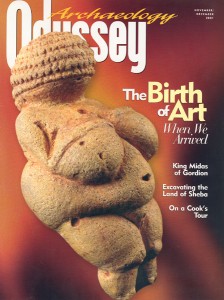The Mythical Midas: Millennia of Calumny
Sidebar to: King Midas: From Myth to Reality
The ruler of the powerful Phrygian kingdom has not been well-treated in Greek myth.
Much of what we know about the mythical Midas comes from the Metamorphoses by the Roman poet Ovid (43 B.C.E.–17 C.E.), who collected tales from Greek myths. One tale recounts how Bacchus, the god of wine, decides to reward Midas for a kindness he showed to Silenus, Bacchus’s old teacher. When the god offers to grant Midas any wish, the king requests that everything he touches turn to gold. Midas finds, however, that he cannot eat or drink, since his food becomes gold as it passes through his lips. Midas begs Bacchus to free him of this curse. The god instructs the king to bathe in the source of the river Pactolus. As Midas immerses himself in the water, his fatal gift is rescinded.
Midas demonstrates his stupidity on another occasion, when asked to judge a musical contest between the rustic god Pan and the glorious god of music and poetry, Apollo. Although Pan merely tootles on a reed pipe while Apollo produces an entrancing music of the spheres on his lyre, Midas awards the prize to Pan.
Furious, Apollo turns the king’s ears into those of a jackass. Midas hides his shameful ears under a specially designed cap and swears his barber to secrecy. Overwhelmed by the enormity of his secret, however, the barber digs a hole in the ground and unburdens himself by whispering into the hole that “King Midas has ass’s ears.” When a thick carpet of reeds takes root in that very spot, word of Midas’s misfortune spreads far and wide every time the wind blows.
Already a library member? Log in here.
Institution user? Log in with your IP address.

